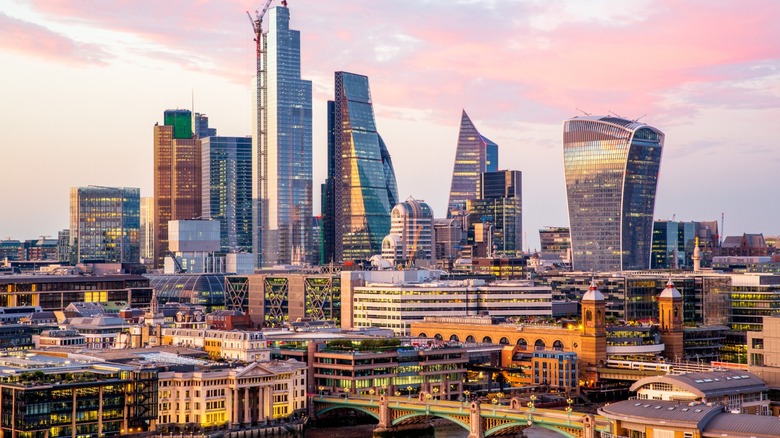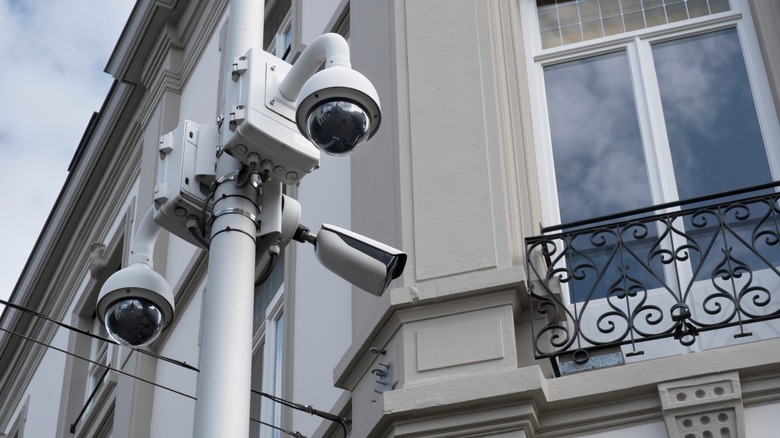Pros & Cons Of Smart Cities: A Look At Their Benefits & Disadvantages
Chances are you're using tech to make your life more efficient, whether it's tracking steps and burned calories, scheduling reminders that pop up on your phone, or using autonomous robot vacuums to handle your chores. Smart cities apply the same concept — collecting massive amounts of data and leveraging digital technology to run more efficiently and, ideally, increase productivity. They're typically designed with sustainability in mind, reducing man-made impacts on climate change, increasing energy independence, and decreasing unnecessary energy use. And they use technology in similar ways across other sectors that make a city a city — including transportation, waste management, and public safety.
A smart city can be built from the ground up by taking a plot of land and investing a ton of capital, so that everything is constructed with digital technology and efficiency in mind. Saudi Arabia is creating a 100-mile-long emission-free city in the middle of the desert that may be the boldest attempt at the concept to date, aiming to have all essential services within a five-minute walk of every resident.
However, you may already live in a smart city and not realize it. New York, London, and Singapore are just a few examples of pre-existing cities that are broadly and intensely employing digital tech to operate at higher levels. But are these investments worth it? Do the advantages of a smart city outweigh its disadvantages? Here's a closer look at the pros and cons of smart cities.
Smart cities offer many benefits
Using data collection and digital technology to make a city more efficient can save a lot of money, which can be redirected toward public services and further investments in growth. Plus, it can ease tax burdens and improve quality of life, which is also raised with features like public Wi-Fi and improved communication — especially important during emergencies such as wildfires, storms, or disease outbreaks, as governments can quickly convey vital information directly to smartphones and digital signs. Even municipal responses to small-scale incidents such as car accidents can be quicker using more efficient communication and traffic control.
Perhaps the most important benefit smart cities provide is sustainability, especially as climate change poses one of the greatest threats to the world. Power-line communication and smart grids help reduce wasted energy and carbon emissions. By offering residents all essential services within a 15-minute walk and building out bike and pedestrian infrastructure, smart cities also let there be a lot fewer smog-producing cars on the road. Supporting ride shares and using more advanced algorithms to better regulate traffic and public transportation also help.
Even upgrading street lights to more energy-efficient LEDs makes a city more sustainable — although sometimes street lights might turn purple. One of a smart city's most futuristic, visually distinct elements can be its green infrastructure, including vertical farms and urban forestry. Buildings of all sizes can be designed to collect and reuse rainwater and conserve energy with solar panels, wind turbines, and architecture that better retains or deflects heat to save on air conditioning and heating.
Data collection can be both good and bad
A key component to smart cities is data collection, vital for the algorithms that improve efficiency. WIth hi-res cameras and tools like facial recognition, cities can give residents greater security. However, the idea of the government tracking your every move is counter to the concept of privacy and has many people — at the very least — raising an eyebrow toward a growing surveillance state.
Often it's not just the government but private companies that are tracking you through your smartphone, whether it's your location or the websites you visit and people you communicate with. As cities and the tech within them grow smarter, even your car can be tracking you in ways you don't realize. Bad actors and digital scam artists can also take advantage of a greater dependence on digital infrastructure — hackers have already held hospitals and other institutions hostage using ransomware to lock them out of their own databases. And nations can deploy advanced cyber-warfare tools to attack enemies' power grids and telecommunications. The more reliant a city becomes on technology, the more vulnerable it is when this tech is used against it.
It's also expensive to develop and nurture a smart city, and may raise taxes. Even worse, smart cities can create greater wealth and technology gaps between groups of people. If cities only focus on wealthier areas and improve them even further, this puts more of a burden on their poorer residents. On a larger scale, similar gaps can grow between smart cities and those that haven't adopted technology, further unbalancing the nation's socioeconomic structure.


